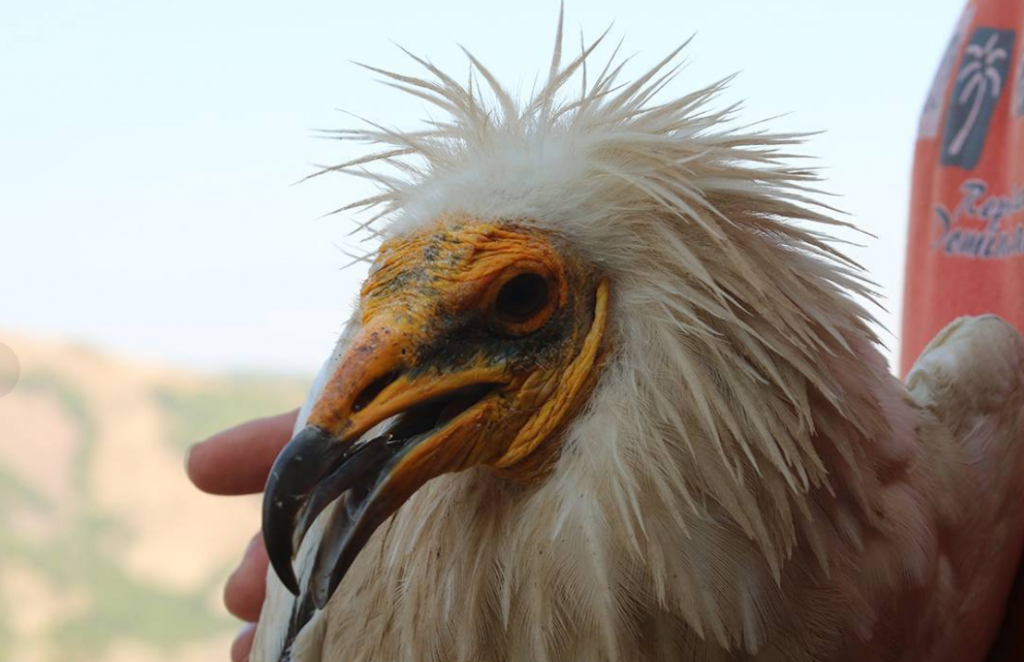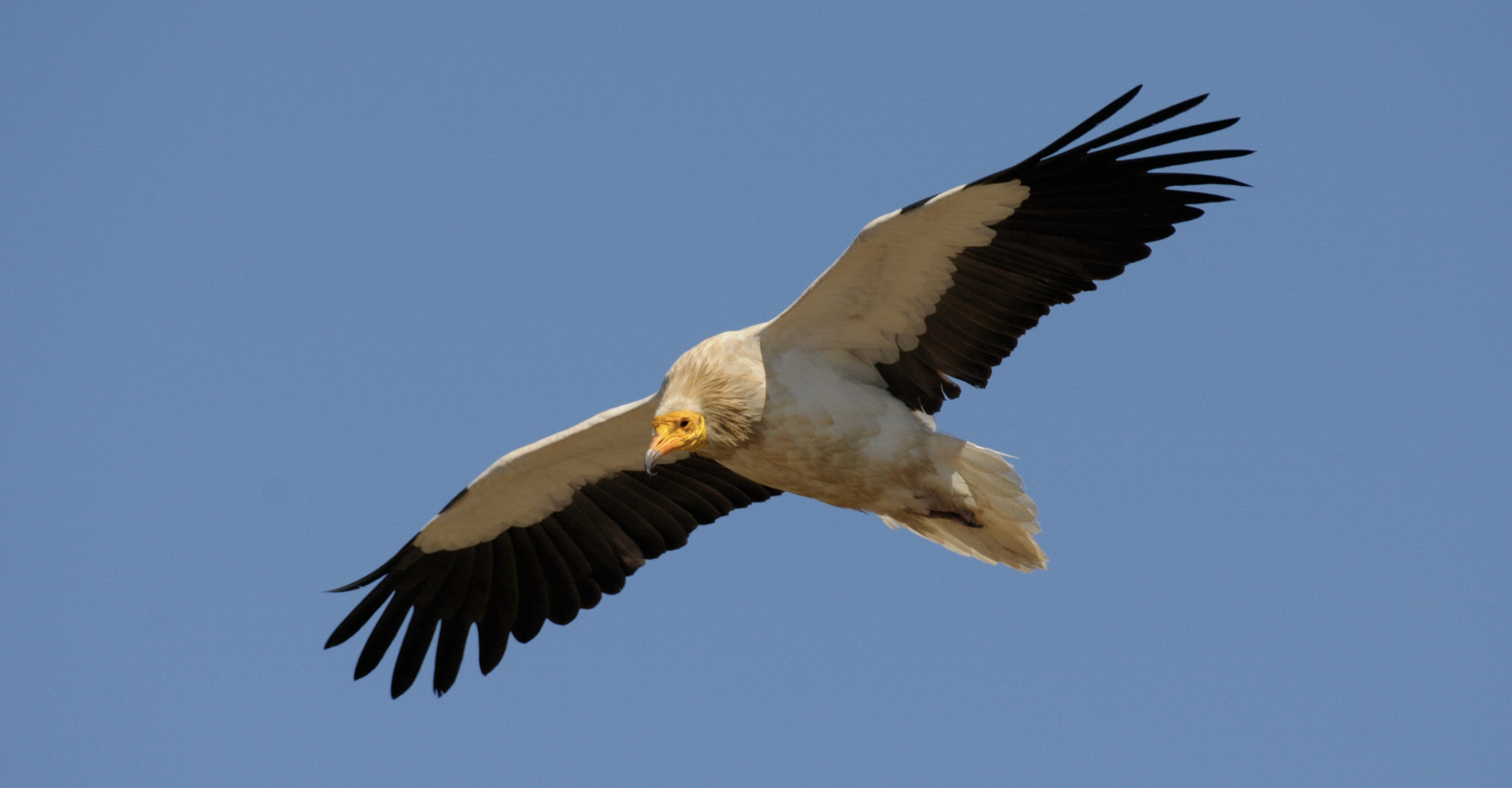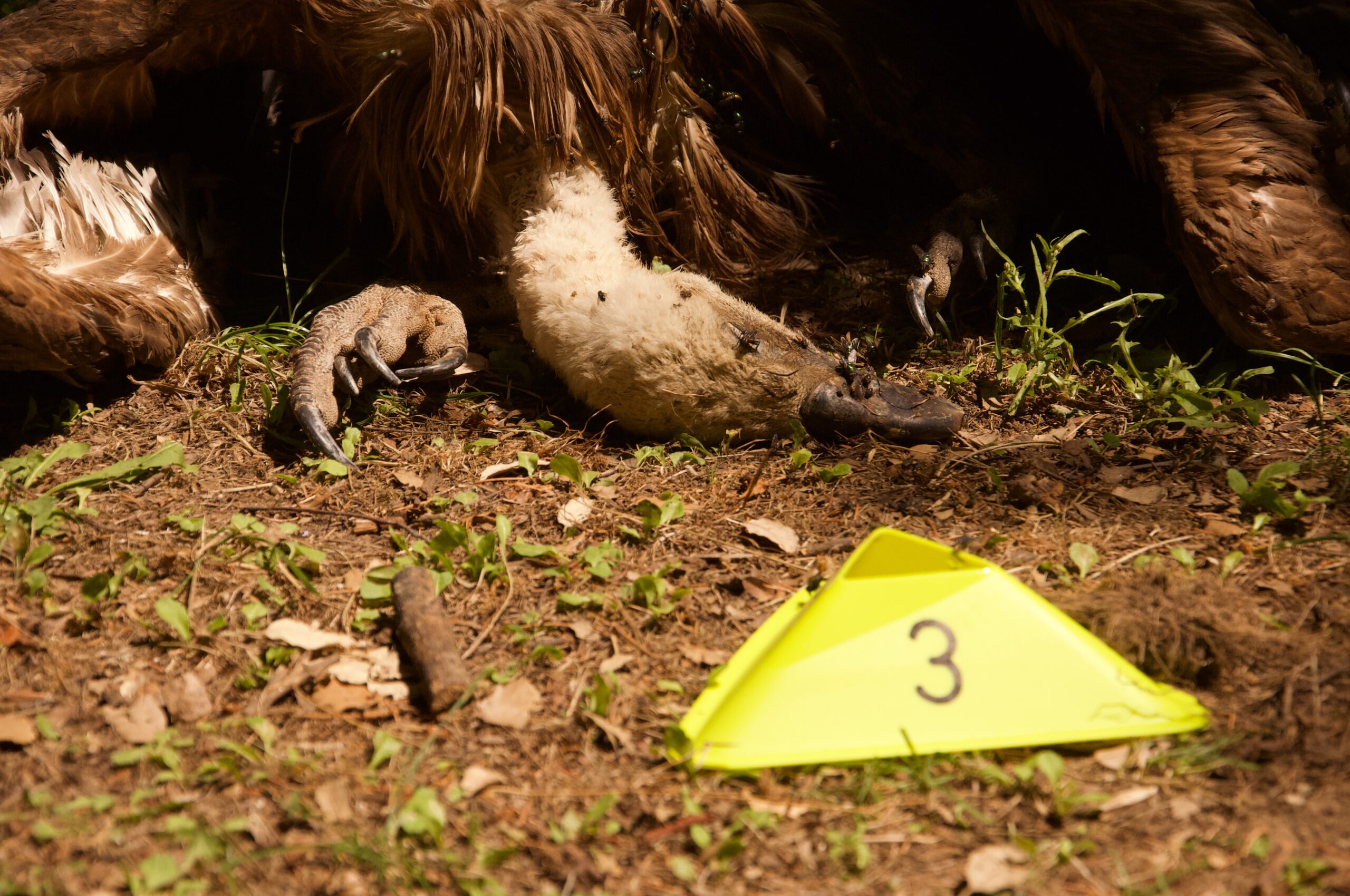
Two Egyptian Vultures from Bulgaria met a tragic fate in Africa in recent months. The culprit behind their sad loss is a common and frequent practice causing mass vulture mortality in Africa and beyond — poisoning. Both Boris and Jenny, the two birds, played a crucial role in better understanding the species as conservationists followed their movements for over five years through GPS tracking.
Egyptian Vulture Jenny

Jenny © Vladimir Dobrev 
Movements of Egyptian Vulture Jenny
Back in 2015, BSPB caught and tagged Jenny as an adult with a satellite transmitter in the Eastern Rhodopes, Bulgaria. Later on that year, she carried out her autumn migration, covering 5223 km in just 17 days from Bulgaria to Chad. Jenny proved to very traditional, following the same routes and bottlenecks in the 11 migratory trips that followed, passing through the Dardanelles in spring and the Bosphorus in the autumn.
In the spring of 2016, on her way back to the Balkans, Jenny faced a big obstacle — a sand storm trapping her in the Sahara. In the meantime, her male partner was long gone from the wintering grounds and was already preparing for the breeding season in Bulgaria. She had to wait for the storm to pass until she resumed her migration, finally arriving at her breeding territory on 19 April, but it was too later. Her male had already found another partner, and Jenny couldn’t stand her ground, so she was forced to leave. She became a floater, a bird without a partner, until the next breeding season in 2017 when she eventually found a new partner. Since then, the new pair managed to raise three chicks successfully. Unfortunately, a tragic fate awaited Jenny.
While on her way to the wintering grounds this past autumn, Jenny suddenly stopped moving on 19 October 2020 near the Ennedi Plateau in northeastern Chad. She was just a few hundred kilometres away from her traditional wintering ground in Central Chad. Staff from African Parks managed to visit the site and found Jenny lying down dead in the desert. Based on the information available, the most probable reason behind her death is considered poisoning — vultures’ biggest threat.
Egyptian Vulture Borris

© Dimitar-Gradinarov 
Map with movements of Borris
A BSPB team trapped and tagged Borris on 21 July 2015 at Studen kladenets feeding site, in the Eastern Rhodopes, Bulgaria. Borris was actually the first Egyptian Vulture adult from Bulgaria to carry a GPS transmitter on his back, helping provide great insight on the species.
Boris always began his migration journey on almost the exact dates each year and used the same route – the Bosphorus, through Turkey, the eastern coast of the Red sea, through Bab el Mandeb to Ethiopia and back to Bulgaria in spring. He wintered in the Somali region of Ethiopia, close to Djibouti and Somalia. To reach his destination, he only needed 17 days on average to overcome more than 4600 km between his nest and his wintering grounds, or about 280 km per day. Since monitoring him, he raised eight chicks and successfully adopted and raised one foster chick.
But, it turned out that his last trip to Africa was his last. In the middle of January in Ethiopia, in the Somali region in his wintering grounds, the life of Boris ended. After receiving a worrying signal, the project team alerted EWNHS, who immediately organized a field mission to the remote place to investigate the case. They discovered Boris lying dead on the ground in a small mountain hill with sparse vegetation. They further found dried intestines from livestock under his body that were most probably used as bait and were laced with poison.
This is not the first case of an Egyptian Vulture being poisoned in the Somali region of Ethiopia. In 2019, another famous adult Egyptian Vulture named Wessal shared the same fate. In December 2020, the immature Alolobad was poisoned together with two Hooded Vultures after consuming goat carcass laced with poison against jackals.These cases underline that poisoning is a major threat to vultures and other wildlife in Ethiopia.
Egyptian Vulture New LIFE

Working collaboratively projects like the Egyptian Vulture New LIFE aims to reinforce the Egyptian vulture population in their Europe’s easternmost range across the Balkans. By actively managing and restocking the population by releasing captive-bred birds the project will support the small Balkan population which number between 60 and 80 pairs across the whole region. The project is working to deliver conservation measures that eliminate major known threats such as illegal poisoning and electrocution in their summer breeding grounds. Monitoring the population closely using GPS transmitters will also help the project tackle the major threats Egyptian vultures face. The Egyptian Vulture New LIFE is a partnership of organisations, led by the Bulgarian Society for the Protection of Birds (BSPB) from 14 countries spanning Europe, the Middle East and Africa, to protect Egyptian vultures not only in Europe but all along their migratory flyway.

Threat of poisoning
The Vulture Multi-species Action Plan (Vulture MsAP), co-developed by us here at the Vulture Conservation Foundation (VCF), and endorsed by the Convention for Migratory Species (CMS), concludes that poison is the biggest threat to vultures worldwide and a significant part of this global action plan for vultures focuses on the actions needed to fight this threat. Furthermore, the Vulture MsAP is a global strategic blueprint identifying priorities and actions to conserve 15 species of old world vultures, approved in the conference of the parties of the Convention for Migratory Species, which states that poison with poisoned baits (often against predators of livestock) is the main threat to vultures worldwide.
The VCF is particularly active in fighting this threat and is implementing many projects across Europe and many actions against poisoning. We are also in contact with some African colleagues fighting this threat, but the news coming from that continent are even bleaker than from Europe – seems that the African vulture crisis that led to several African vulture species being considered globally endangered in the last few years is continuing. In Europe, we are actively pursuing different lines of work to fight this threat, among which is the BalkanDetox LIFE project, a LIFE-funded project, which aims to tackle this threat by raising awareness and building capacities across seven Balkan countries, including Bulgaria.



